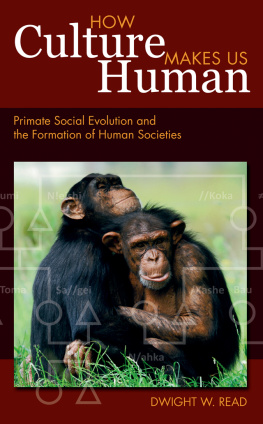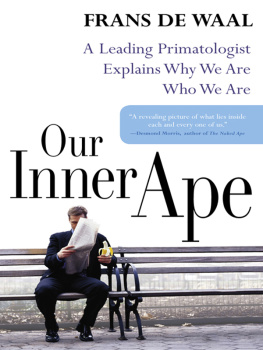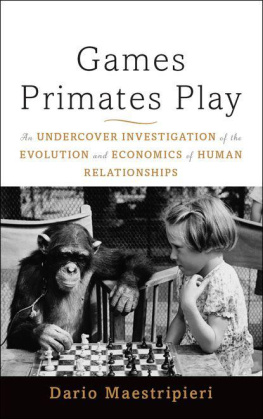Primate Behavior and Human Origins
This comprehensive introduction demonstrates the theoretical perspectives and concepts that are applied to primate behavior, and explores the relevance of non-human primates to understanding human behavior. Using a streamlined and student-friendly taxonomic framework, King provides a thorough overview of the primate order. The chapters cover common features and diversity, and touch on ecology, sociality, life history, and cognition. Text boxes are included throughout the discussion featuring additional topics and more sophisticated taxonomy. The book contains a wealth of illustrations, and further resources to support teaching and learning are available via a companion website. Written in an engaging and approachable style, this is an invaluable resource for students of primate behavior as well as human evolution.
Glenn E. King is Professor Emeritus of the Department of History and Anthropology at Monmouth University, USA.
First published 2016
by Routledge
2 Park Square, Milton Park, Abingdon, Oxon OX14 4RN
and by Routledge
711 Third Avenue, New York, NY 10017
Routledge is an imprint of the Taylor & Francis Group, an informa business
2016 Glenn E. King
The right of Glenn E. King to be identified as author of this work has been asserted by him in accordance with sections 77 and 78 of the Copyright, Designs and Patents Act 1988.
All rights reserved. No part of this book may be reprinted or reproduced or utilized in any form or by any electronic, mechanical, or other means, now known or hereafter invented, including photocopying and recording, or in any information storage or retrieval system, without permission in writing from the publishers.
Trademark notice: Product or corporate names may be trademarks or registered trademarks, and are used only for identification and explanation without intent to infringe.
British Library Cataloguing-in-Publication Data
A catalogue record for this book is available from the British Library
Library of Congress Cataloging-in-Publication Data
King, Glenn E.
Primate behavior and human origins / Glenn E. King.
pages cm
1. Primates--Behavior. I. Title.
QL737.P9K535 2016
599.815--dc23
2015017537
ISBN: 978-1-138-85316-4 (hbk)
ISBN: 978-1-138-85317-1 (pbk)
ISBN: 978-1-315-72300-6 (ebk)
Typeset in Goudy
by Saxon Graphics Ltd, Derby
To the people who have meant the most to me
In my professional life
Sherwood L. Washburn
William A. Lessa
William P. Mitchell
and in my personal life
Barbara Barrett
Cynthia King
David King
Kimberly Spurgeon
Edith King
Contents
In graduate school primate behavior lured me away from other fascinating specialties and actual experiences did nothing to change that feeling. The first was a sweltering summer in New Mexico, observing a colony of captive chimpanzees that impressed me with their intelligence, strong personalities, and complex relationships. Next, I studied three kinds of baboons (a loose term for certain large monkeys) in the Los Angeles Zoo. The fog of rising at dawn began to lift when Billy, the adult male mandrill, gave me the seemingly fearsome snarl that is really a greeting in his species ().

A male mandrill grinsa friendly expression. abzerit via iStock
In Africa I observed baboons in their natural setting. Expected behavior patterns were spiced by unusual occurrences, such as a male baboon lifting an infant over his head in a movement reminiscent of a human fathers play. Ordinary events sometimes assumed unexpected dimensionsthe simultaneous crunching of crisp fruits by 30 or 40 baboons became hilarious. And there were close encounters like those at the Serengeti Lodge, where a vervet strolled into the restaurant and a baboon tried to become my roommate.
Primate studies also bring you into contact with interesting people, many of them nice. I was swindled in Nairobi, but invited to a dinner of roast goat by a chance acquaintance. I was bawled out by a pompous minor official in a Tanzanian park, but invited to share meat (Karibu chakula) with a hospitable game warden. I was frustrated by elusive baboons in South Africa, but comforted by one of the best cooks and one of the kindest couples I have ever met. And I learned that two people can communicate about important things despite rudimentary knowledge of one anothers languages.
William A. Lessa provided a floundering new graduate student at UCLA with support and direction, nurturing a continuing interest in cultural anthropology. Sherwood L. Washburn opened a new world of primate behavior in relation to human evolution. He guided me to my doctorate at Berkeley, along with Phyllis Dolhinow. William P. Mitchell escorted me through the intricacies of professorship at Monmouth University and became a good friend along the way.
Dr. John Cavallo and Dr. Rob Blumenschine were essential to my first field trip to Africa. Im also grateful to the good people of Kenya and Tanzania, who facilitated my work and made my stay pleasant, especially my driver Daniel. When problems arose in my work in South Africa, my troubled soul was soothed by the kindness of Jesse Felthuis, manager and chef extraordinaire at the Makhasa Game Reserve, and by the very generous help and hospitality of Xander and Susan Combrink at the Mkhuze Reserve. Meeting and talking with Zulu people at Makhasa was a great pleasure.
Many people encouraged me in the long trek to this book. Foremost is my fabulous wife Barbara Barrett, who was always there with whatever I needed most, whether it was techinal advice, a loving word or a snarky remark. Im also grateful to Cynthia King, Al King, Jack Bufton, Mary Carol Stunkel, and many others at Monmouth University in New Jersey and St. Marks Episcopal Church in Highland, Maryland. Special thanks go to the Department of History and Anthropology at Monmouth and to Dr. Kenneth Stunkel, who again provided both moral and immoral support.
Brian Barrett made valuable comments on parts of the manuscript. Lin Gaylord midwifed the project. Katherine Ong and Lola Harre of Routledge guided it to maturity with cheerful skill and great patience. It has been a great pleasure working with them.
An undertaking like this one requires ready access to an enormous and varied professional literature. I am deeply grateful to the following individuals for making the resources of the Monmouth University Library available to me: Dr. Thomas Pearson, Provost; Dr. Ravindra Sharma, Dean of the Library; and Grey Dimenna, Esq., University Attorney.
Im very thankful to all the colleagues who have made their work available via mailed reprints in the past and online in more recent times. The personal and laboratory websites of colleagues have been enormously helpful and ResearchGate and Academia.edu. have also been of great value. For images in this book I want to acknowledge the generosity of Yvonne de Jong and Tom Butynski; Rhett Butler and Mongabay, and with special thanks, Stacey Tecot, Eric Matthews, Chimpanzee Sanctuary Northwest, and Curt Busse.








